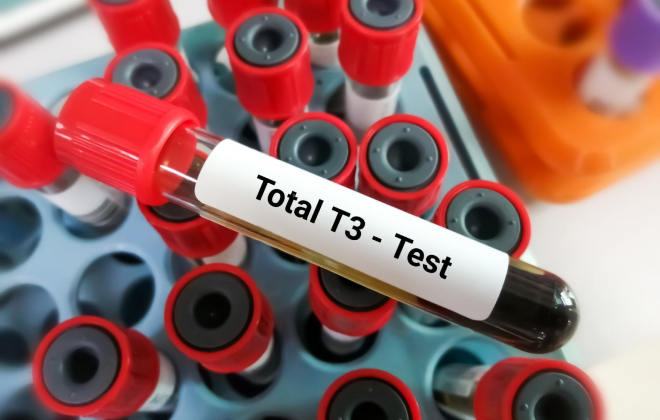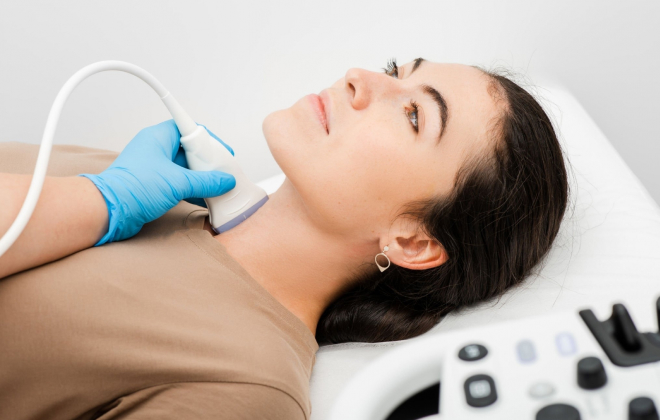




Thyroid is a small butterfly shaped gland located in the front of our neck. It is a part of the endocrine system that helps in the proper functioning of our body. The endocrine system consists of a network of glands that release chemicals known as hormones into our bloodstream. These hormones coordinate different functions of our body by carrying messages to skin, muscles, organs and other tissues through the bloodstream. Our body has several endocrine glands which help us to stay healthy. One of the most important among them, the thyroid gland controls metabolism and how our body uses energy.
However, sometimes, the thyroid gland fails to work properly leading to a range of side effects. The most common thyroid-related disorders are hyperthyroidism and hypothyroidism which can result from an overactive or underactive thyroid gland respectively. Several factors can contribute to the development of these disorders such as autoimmune diseases like Hashimoto’s thyroiditis or Graves’ disease, iodine deficiency, genetic predisposition, or certain medications.
Thyroid disorder is not uncommon. As per estimates, about 10% of the world population experiences some form of thyroid dysfunction during their lifetime. Women are particularly susceptible to these conditions due to hormonal fluctuations throughout their lives.
Early diagnosis is essential for effective management of thyroid-related disorders, preventing complications and improving quality of life.
Hormones are important for regulating the function of the thyroid gland, a butterfly-shaped gland in the neck. The thyroid produces hormones that are necessary for controlling metabolism, growth, and maintaining a balanced internal environment in the body. The main hormones produced by the thyroid are thyroxine (T4) and triiodothyronine (T3). The role of these hormones in thyroid function are:
TRH is released by the hypothalamus, a region in the brain. It stimulates the anterior pituitary gland to produce and release thyroid-stimulating hormone (TSH).
TSH, also known as thyrotropin, is released by the anterior pituitary gland. It stimulates the thyroid gland to produce and release T3 and T4. TSH acts on the thyroid gland by binding to specific receptors on its surface, which triggers the uptake of iodine and the synthesis of T3 and T4.
Thyroxine (T4) and Triiodothyronine (T3): Iodine is an essential mineral required for the synthesis of thyroid hormones. The thyroid gland takes up iodine from the bloodstream and incorporates it into the structure of T3 and T4. Both T3 and T4 are the main thyroid hormones, with T4 containing four iodine atoms and T3 containing three. T4 is produced in larger quantities by the thyroid gland, but it is relatively less active than T3. These hormones play a central role in regulating metabolism, energy production, and various physiological processes in the body.
Thyroid diseases are commonly characterised by a variety of symptoms that can significantly impact individuals’ daily lives.
Overall, identifying the common symptoms associated with thyroid diseases is crucial for early detection and effective management to mitigate their negative impact on daily life.
Thyroid diseases encompass a broad spectrum of conditions that affect the thyroid gland, resulting in impaired hormone production and a variety of symptoms.
Hyperthyroidism is a common endocrine disorder characterised by excessive production of thyroid hormones by the thyroid gland. This condition results in an overactive metabolism, which leads to numerous physiological and psychological effects.
An autoimmune disorder, is the leading cause of hyperthyroidism. It occurs when antibodies excessively stimulate the thyroid gland. Primarily affecting young to middle-aged women, this condition also has a familial predisposition.
Refers to inflammation of the thyroid gland caused by viral or autoimmune factors; it can present either with hyper- or hypothyroid symptoms.
A condition that occurs when one or more nodules of the thyroid gland become excessively active. Health experts are uncertain about the underlying causes of this phenomenon.
Hypothyroidism is a common endocrine disorder characterised by the insufficient production of thyroid hormones by the thyroid gland. It affects individuals worldwide, with women being more prone to developing this condition.
Occurs when the body’s immune system mistakenly attacks and damages the thyroid gland. Over time, this can lead to a decrease in thyroid hormone production.
Is when someone has undergone thyroid surgery to remove a portion or all of the thyroid gland, or if they’ve received radioactive iodine treatment for hyperthyroidism. This can lead to decreased thyroid hormone production.
Where some babies are born with an underdeveloped or non-functioning thyroid gland. This is usually detected through newborn screening and requires prompt treatment to prevent developmental issues.
Hashimoto’s thyroiditis, also referred to as autoimmune thyroiditis or chronic lymphocytic thyroiditis, is an autoimmune disorder that triggers inflammation and harm to the thyroid gland. This condition arises when the immune system erroneously recognises the thyroid gland as an external entity and launches an attack against it. Consequently, the production of thyroid hormones is reduced, potentially resulting in the enlargement of the gland, commonly known as goitre.
Can significantly influence the development of Hashimoto’s thyroiditis. People with a family history of autoimmune or thyroid disorders have a higher chance of developing this condition. Certain genes that regulate the immune system and thyroid function may contribute to this increased susceptibility.
Encompass a range of factors, such as infections, exposure to specific chemicals or toxins, and even dietary elements. Notably, viral infections have been strongly associated with the onset of autoimmune thyroiditis.
Can be a major cause in individuals with a genetic predisposition. Instead of protecting the body, the immune response targets the thyroid tissue, causing inflammation, tissue damage, and a decrease in the production of thyroid hormones.
Thyroid cancer is a rare but important type of cancer that starts in the thyroid gland, located in the neck below the Adam’s apple. The thyroid gland is crucial for regulating various bodily functions such as metabolism and growth by producing hormones. While thyroid cancer is not very common, it can have a significant impact on those affected, making timely diagnosis, treatment, and ongoing monitoring essential.
Exposure to high levels of radiation, especially in childhood, greatly increases the likelihood of developing thyroid cancer. This radiation can come from different sources, such as medical treatments like radiation therapy for other cancers, environmental factors, or nuclear accidents.
Family History of thyroid cancer or other endocrine-related cancers may pose a significant risk. In addition, certain genetic mutations passed down from relatives can also increase the chances of developing thyroid cancer.
Age and Gender are other significant causes. Thyroid cancer is more common in women than in men. Additionally, the risk of thyroid cancer increases with age, with most cases diagnosed in people between the ages of 30 and 60.
Thyroid tumours comprise a wide range of growths that may develop within the thyroid gland, a small organ shaped like a butterfly located in the front of the neck. These tumours can be either benign (non-cancerous) or malignant (cancerous), and their characteristics, impact on health, and necessary treatments can vary significantly.
Genetic Predisposition can play a significant role in the development of thyroid tumours. Certain genetic mutations and inherited syndromes increase the risk of thyroid cancer.
Iodine Intake in your diet can affect your risk of thyroid tumours. If you have too little or too much iodine, you may have a higher chance of developing thyroid tumours. Iodine is important for thyroid hormone, and if there are imbalances in its levels, it can greatly affect how your thyroid works and may lead to tumour growth.
Hormonal Imbalances can contribute to the development of thyroid tumours. For instance, exposure to high levels of oestrogen, as in certain hormonal conditions or hormone replacement therapy, has been linked to an increased risk of thyroid tumours.
Thyroid diseases can have profound effects on an individual’s overall well-being, necessitating accurate and timely diagnosis for effective management. Diagnostic tests play a crucial role in identifying thyroid diseases, allowing healthcare professionals to customise treatment plans accordingly.

The combination of these diagnostic tools enables clinicians to accurately identify different types of thyroid diseases, facilitating appropriate interventions and improving patient outcomes.
Thyroid diseases encompass a range of conditions that can disrupt the normal functioning of the thyroid gland, necessitating appropriate treatment options. Medication and surgery are two prominent avenues to manage these disorders effectively.

Advancements in surgical techniques such as minimally invasive approaches have significantly improved patient outcomes and reduced recovery time.
Thyroid diseases, such as hypothyroidism and hyperthyroidism, have far-reaching effects on various aspects of an individual’s well-being, including metabolism, mood, and energy levels. By providing individuals with accurate and up-to-date information about their condition, they can make informed decisions about treatment options, lifestyle modifications, and the importance of ongoing monitoring and follow-up care.
Furthermore, having knowledge about their conditions can help in reducing anxiety or confusion surrounding their thyroid disease diagnosis, enabling patients to actively participate in their personal healthcare journey. Equipping individuals with the necessary tools to understand their condition fosters a sense of control and autonomy while ensuring open communication between patients and healthcare providers.
Sources:
Spread the love, follow us on our social media channels